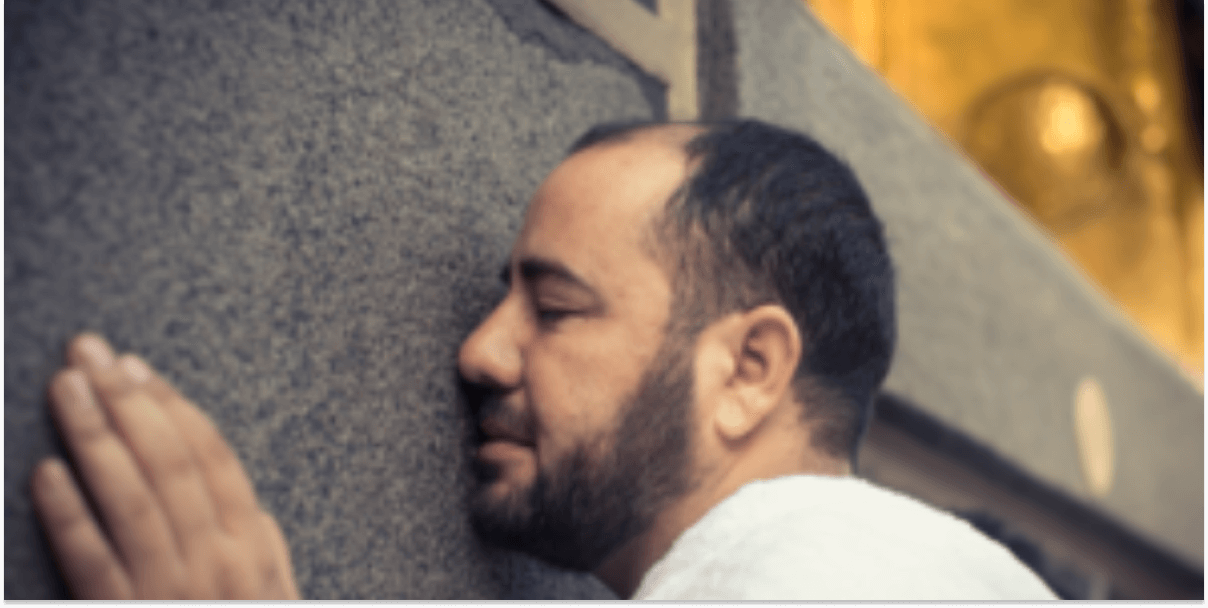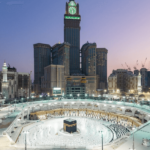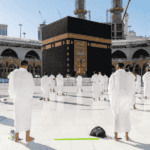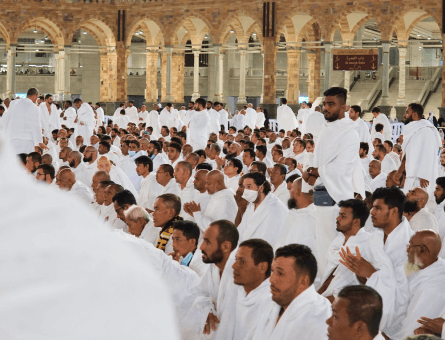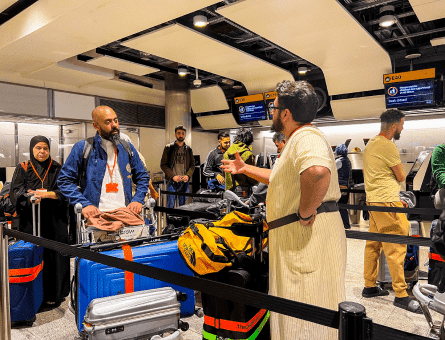How Hajj can change your life
The Hajj Pilgrimage draws people from all over the world, forming a vast crowd linked by faith and a shared goal. Millions head to Mecca, where every footstep carries the weight of centuries filled with devotion and history. Picture the rush of joining such a huge gathering—one of the biggest on the planet—where the experience shifts how the world and oneself are seen. Around 2.5 million people make this journey every year, each with their own hopes and stories packed in their hearts. The air hums with prayers and footsteps, sounding like waves rolling in perfect rhythm. For anyone after a deep spiritual reset and a real test of strength, Hajj offers a path like no other. This trip goes beyond time and culture, inviting those hungry for deeper meaning. Keep reading to find out why this journey triggers a change that lasts a lifetime.
Here one’s thoughts are concentrated on Allah, and with intense devotion.
When one reaches the holy places, one finds the atmosphere filled with piety and serenity. One visits places that bear testify to the glory of Islam, and all this leaves an indelible impression on one’s soul.
It is a great favour Allah has bestowed upon us servants so that we can draw closer to Him and have our sins forgiven.
Prophet Muhammad صلى الله عليه وعلى آله وسلم indicated:
There are, many benefits that we can derive from this journey. Makkah is the centre towards which we Muslims must converge once a year, meeting in general and refreshing in ourselves the faith that we are all equal, irrespective of geographical or cultural origin. Thus, pilgrimage unites the Muslims of the world into one international fraternity.
It is narrated by some that Hajj is the ultimate struggle for some and in return Allah grants them the ultimate reward.
The Prophet Muhammad صلى الله عليه وعلى آله وسلم said:
“Umrah and Hajj are the jihad for the old, the young, the weak and women.” It was also narrated that the Prophet صلى الله عليه وعلى آله وسلم said: “Hajj is jihad and Umrah is a voluntary act.”
“A man once approached the Prophet صلى الله عليه وعلى آله وسلم and said: “I want to make jihad for the sake of Allah.” The Prophet صلى الله عليه وعلى آله وسلم replied: “Shall I guide you to a kind of jihad that will cause you no harm?” “Yes,” the man replied. The Prophet صلى الله عليه وعلى آله وسلم said: “Perform Hajj”.”
The journey of Hajj instils in a pilgrim’s heart the meaning of seeking refuge in Allah and the pleasure of attaining Divine propinquity. Allah says in the Quran:
“Therefore, flee to unto Allah.” [Surah Adh-Dhariyat 51:50]
Although the meaning is spiritual, it has physical manifestations: a pilgrim leaves behind his house, family, adornments, property, abandons desires, spends money, exerts great efforts and endures the hardships of travel and life away from home to visit the Sacred House of Allah of which Allah says:
A pilgrim flees to the House of Allah aspiring salvation in this world and in the Hereafter from his sins and shortcomings. He seeks a chance to turn over a new leaf, hoping that Allah may admit him among those who have gained His Pleasure, on them shall be no fear, nor shall they grieve.
The blessed journey of Hajj asserts the unity of Muslims, who assemble at the same time and place to worship one God and direct themselves towards one Qibla (direction of the Ka`bah).
For people from all corners of the globe, the Sacred House represents a greater homeland that affords them security; in Makkah, “the mother of all cities” as Allah called it, all barriers created by race, countries, languages, colour and cultures are removed. There is no difference between rich and poor, all are equal in their need of Allah, the Almighty.
This scene of a civilized conference of different peoples is confirmed in the words of Allah Who says:
What are the blessings of Hajj?
One may describe them in great detail. But, in the Qur’an, where Allah instructs Ibrahim to invite people to come to Hajj. Allah says:
Hence, the real blessings of Hajj can only be experienced by those who actually perform it. Imam Abu Hanifah, as narrated, was unsure which act of worship was more excellent among the various ones laid down by Islam.
But once he had performed Hajj, he had no hesitation in declaring that Hajj was the most excellent of all. You will find that your love of Allah heightens as you start preparing for your pilgrimage journey with the sole intention of pleasing Allah.
With your heart longing to reach your goal, you become purer in thought and deed. You repent for past sins, seek forgiveness from people whom you might have wronged, and try to render your due to others where necessary so as not to go to Allah’s court burdened with injustices that you may have done to your fellow beings.
In general, the inclination to do good intensifies, and abhorrence of doing evil increases.
After leaving home, the closer you get to the House of Allah, the more intense becomes your desire to do good. You become careful so that you harm nobody while you try to render whatever service or help you can to others. You avoid abuse, indecency, dishonesty, squabbles, and bickering because you are proceeding on the path of Allah.
Thus, your entire journey constitutes an act of worship.
How, then, can you do wrong? This journey, in contrast to every other, is a continuing course through which a Muslim attains a progressive purification of the self. On this journey you are pilgrims to Allah.
It is now easy to see that for two or three months, from the time of deciding and preparing for Hajj to the time of returning home, a tremendous impact is made on the hearts and minds of pilgrims.
This process entails sacrifice of time, sacrifice of money, sacrifice of comfort, and sacrifice of many physical desires and pleasures, and all this simply for the sake of Allah, with no worldly or selfish motive.
Together with a life of sustained piety and virtuousness, the constant remembrance of Allah and the longing and love for Him in the pilgrim leave a mark on one’s heart which lasts for years.
The pilgrim witnesses at every step the imprints left by those who sacrificed everything of theirs in submission and obedience to Allah.
This lesson in courage and determination, the impetus to strive in the way of Allah, which a devotee of Allah can draw from these clear signs and inspiring examples, can hardly be available from any source other than Hajj.
The attachment developed with the focal point of his religion by walking round the Ka`bah (Tawaf), and the training received to live a Mujahid’s life through the rites of Hajj (such as running from place to place, repeated departures, patiently waiting, food rations, and restraints from desires) are great blessings indeed.
Combined with the Prayer, fasting, and almsgiving (Zakah), looked at as a whole, you will see that Hajj constitutes a preparation for the great task, which Islam wants Muslims to do. This is why it has been made compulsory for all who have the money and the physical fitness for the journey to the Ka`bah.
This ensures that, in every age, there are Muslims who have passed through this ultimate training of body, mind and soul.
Lessons from Hajj
Hajj contains many lessons that Muslims should learn. It assures the fact that all Muslims are one Ummah (nation) and instils in the pilgrims the unique values of Islam. In summary:
Love and Devotion to Allah
A Muslim’s relation with Allah is that of deep love, devotion and obedience. We love Allah as He loves us:
Prophet Ibrahim loved Allah and Allah took him as a friend (Khalil):
“Allah took Ibrahim as a friend.” [Surah An-Nisaa’ 4:125]
Hajj is deeply associated with Prophet Ibrahim and his life story. Hajj gives us a sense of history.
Our faith is deep-rooted in history. This is the religion of Allah given to us by His many Prophets: Adam, Nuh, Ibrahim, Isma`il and finally Prophet Muhammad صلى الله عليه وعلى آله وسلم.
These were the people who loved Allah, and Allah loved them the most, making them the guides of humanity.
Universal Spirit of Islam
People of all races, colours and nationalities perform Hajj, becoming one without any class or distinction.
Looking and dressing alike while performing the same actions. The spirit of Hajj is to foster unity and universal brotherhood and sisterhood among the believers.
Giving a Focus, Centre and Orientation
We have one Qibla which is our direction of worship. Providing us focused unity and purpose in our life, in preparation for the Hereafter.
Our focus of life is Allah and the book of Allah that we must hold fast together
“And hold fast all together Allah’s rope and be not divided…” [Surah Al-Imran 3:103]
Peace and Harmony
The pilgrims come in peace and spend their time together in the most peaceful and respectful manner.
They do not harm anyone or anything.
This is also the spirit of Islam. Islam is a total commitment to care, compassion and kindness. Hajj is the symbol of this commitment and it must be manifest in our daily life.
Motion, Action, and Sacrifice
The pilgrim keeps on moving all the time, with Tawaf, Sa`i, going to Mina, Arafat, Muzdalifah, the Jamarat, and other places. It is a dynamic ceremony and this is the way a Muslim’s life should be. Motion, action, and sacrifice; these things bring success in this life and salvation in the Hereafter.
Hajj is first and foremost one of the most beloved worships to Allah that unites the Muslims in His Servitude, and reconnects the Ummah with its pure, monotheistic foundations established by Ibrahim. In addition to remembering and reliving the experiences of our spiritual forefather and his blessed family.
Allah has also designed the Hajj to yield numerous and multifaceted benefits: it strips you of the worldly distractions so you can focus on remembering Allah and purifying your heart; it provides you with intensive moral, social, and physical training and discipline; it repeatedly foreshadows situations of the Hereafter so you can remember its reality and prepare for it.
It dissolves superficial distinctions between you and fellow Muslims and gives you the chance to develop new, long lasting relationships and bonds with them; and it reminds you of the age old enemy who you’ll continue battling against, even with your rejuvenated Emaan when you return home.
When you go through this worship solely for Allah, and adorn it with His remembrance, righteous deeds, kindness, gentleness and beautiful character with your fellow Muslims, then In’Sha’Allah (God Willing) that is the Hajj Mabrur (the one accepted by Allah) which earns you the reward of none other than Paradise, and sends you back home sinless as your mother bore you.
Now, isn’t it a blessing that Allah made Hajj obligatory (for whoever has the means)? It’s out of Allah’s mercy that He wants His servants to be showered with these countless gifts when they travel to His sacred House as His guests.
There is one last thing Allah wants instilled in you before leaving. The Arabs of pre Islamic Arabia would gather in Mina after completing the rites of Hajj and boast about their forefathers to boost their reputation amongst other Arabs. Allah now tells the believers:
““And when you have completed your rites, remember Allah like your (previous) remembrance of your fathers or with (much) greater remembrance.” [Surah Al-Baqarah 2:200]”
After just finishing a series of rites that train you to constantly remember Allah, He wants you to keep it up even more! That way, when you go back home, you’re hooked on Allah’s dhikr (remembrance).
After all, how could one forget Him when He’s the One Who guided you, blessed you and chose you from amongst millions of Muslims to visit His sacred house and follow the footsteps of Ibrahim, Isma`il, Hajar, and Muhammad صلى الله عليه وعلى آله وسلم like countless believers who walked this earth before you.
““And whoever obeys Allah and the Messenger; those will be with the ones upon whom Allah has bestowed favour of the Prophets, the steadfast affirmers of truth, the martyrs and the righteous; and what excellent companions these are.” [Surah An-Nisaa 4:69]”


